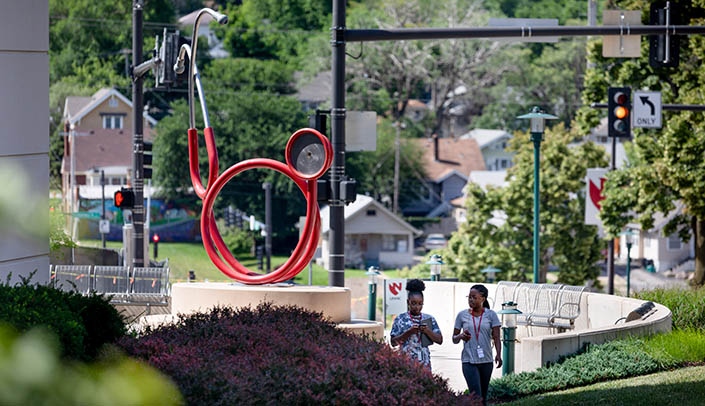A recent survey found that the vast majority of UNMC employees like their work and report a strong sense of accomplishment. Many understand the mission and feel a valued part of the UNMC family. The survey also found that some employees do not believe there is adequate, timely and effective communication with their areas, and some do not regard their pay as fair and do not have a good understanding of pay practices.
Those findings were among the many campuswide results from the spring RESPECT Employee Engagement Survey, in which more than 72% of employees participated.
Ice cream social
To celebrate the survey’s strong employee participation rate, Chancellor Gold and UNMC Human Resources will host an ice cream social on Sept. 19 from 3 to 6 p.m. for UNMC faculty and staff. Watch UNMC Today for details.
“It is so important that we hear your voice and I am very pleased with the high response rate,” said UNMC Chancellor Jeffrey P. Gold, M.D. “We are analyzing the results and will continue to improve where we are strong, while also addressing areas where there is opportunity for growth.”
See a summary of survey results
According to the survey results:
- The vast majority of employees like their work, believes it makes good use of their skills and abilities, and provides them with a sense of accomplishment. They have the resources they need to complete their work and managers recognize them for work well done.
- Employees report feeling part of a team and describe their co-workers as cooperative. They view safety as an organizational priority and are proud to work for UNMC.
- Some employees do not regard their pay as fair and do not have a good understanding of pay practices. Also, employees would like more effort aimed at getting their opinions heard and more open two-way communication, particularly with their immediate supervisors and managers.
UNMC employees have completed an engagement survey on a recurring basis since 2002 as a way to help discover the organization’s strengths and opportunities for improvement. Over the past two years, HR leadership has evaluated the process and assessed a new survey instrument from Engage2Excel, which both UNMC and the University of Nebraska at Omaha used this spring.
Aileen Warren, assistant vice chancellor for human resources at UNMC, and her team are meeting with campus leaders, deans and business units to explain what the survey data found and how they can meaningfully build upon strengths and ways to address concerns at all levels of the organization.
Already, the University of Nebraska Central Administration is exploring conducting a pay equity study for staff members, which will better address one facet of the survey’s findings. In addition, UNMC HR is discussing increasing education around employee compensation to help faculty and staff better understand the university’s pay practices, as well as the available benefits beyond pay.
As results are analyzed, additional programs and initiatives are likely, Warren said, similar to how past feedback led to:
- The new Re-Imagining U program, which puts employees in charge of their own career development;
- Extensive unit specific communication strategies to foster open bidirectional communication and surface common challenges and opportunities for UNMC;
- Developing resources including a leave program, in coordination with the University of Nebraska system, to assist those impacted by the spring flooding; and
- Scheduling more town-hall forums to allow Dr. Gold and a wide spectrum of campus, academic and business leaders to provide campus updates and answer any questions.
Managers are expected to meet with their teams this fall to discuss their unit results.
